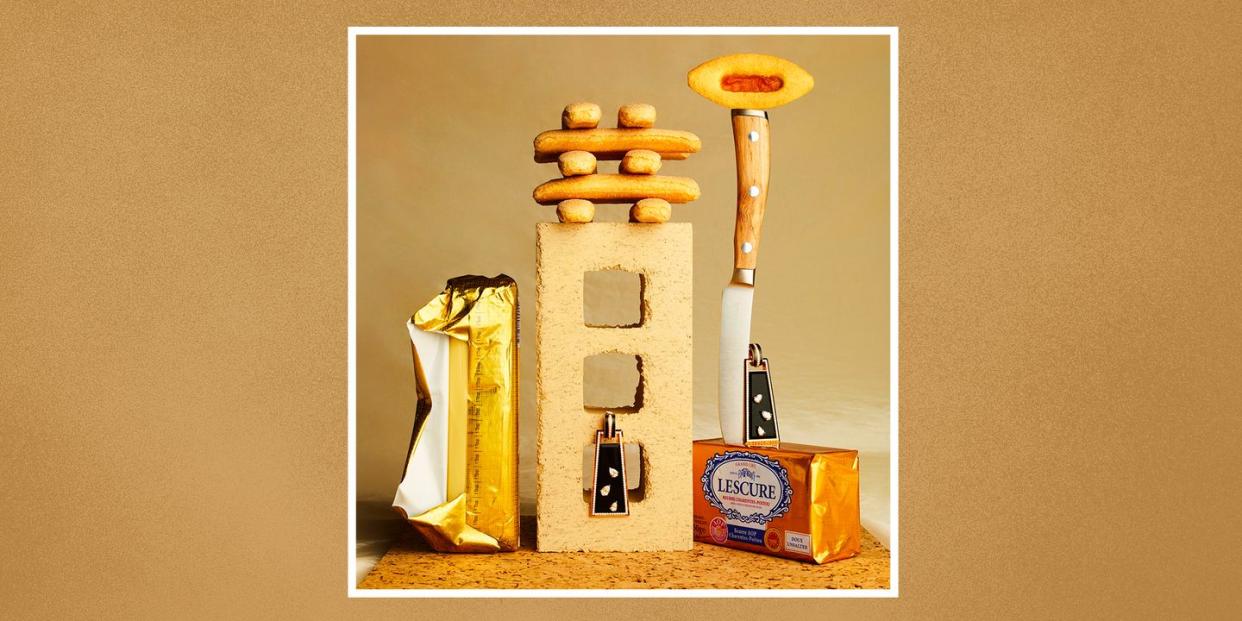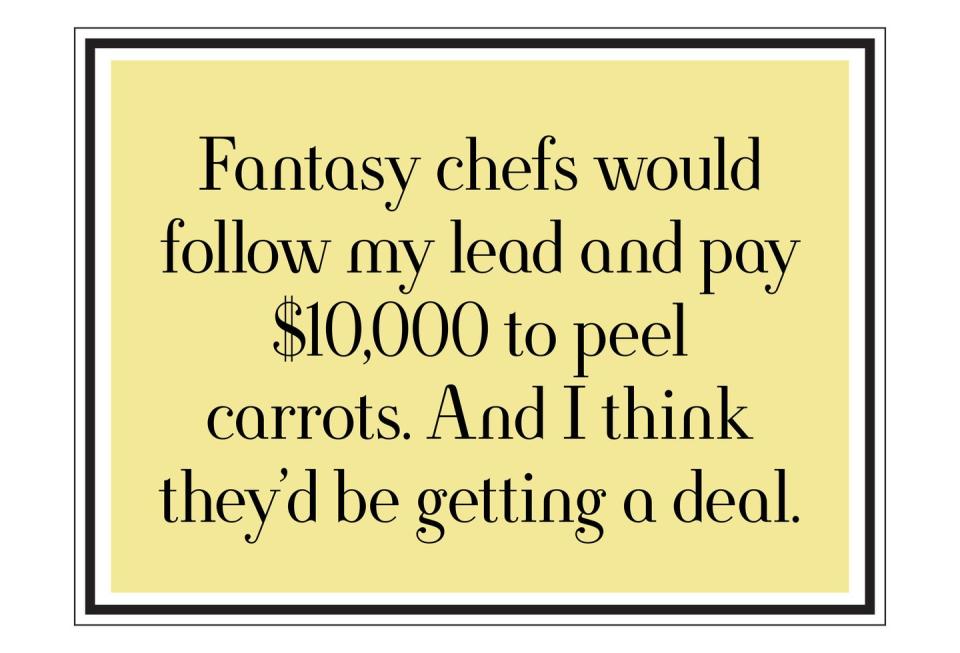Fine Dining 101: A Restaurant Regular Takes a Turn Behind the Stove

- Oops!Something went wrong.Please try again later.
Some people watch sports and wonder if they could play professionally. I eat at great restaurants and wonder whether I could work in the kitchen.
I don’t have the knife skills to julienne or chiffonade, so my dream of being a chef is akin to wanting to play for the Yankees but not knowing how to catch.
Luckily, Ludo Lefebvre, the handsome, tattooed, Michelin-starred chef who owns the Petit Trois restaurants in Los Angeles, didn’t know that.
At noon on a Thursday I walked through the swinging kitchen door of Chez Maggy, Lefebvre’s bistro at the Thompson Hotel in Denver. I was met by chef de cuisine Jeff Schwing, who was much cheerier than I thought chefs were allowed to be. He gave me a black button-down shirt, an apron, and the worst knife I’ve ever used. It had a plastic handle, a dull blade, and, I’m guessing, a rich history of opening Amazon packages.
I was there to “stage”—the French term for unpaid interning at a restaurant either to learn or audition for a job. But I had created staging as an entirely new endeavor, as a baseball fantasy camp for foodies. Soon dentists and executives alike would follow my lead and pay to peel carrots at Le Bernardin. The fantasy chefs would show their friends photos of them holding a pan with Eric Ripert and explain how they now understand that a kitchen is too hot and too stressful, and how they appreciate fine dining more than they did before. And I think they’d be getting a deal.
The first thing Jeff taught me was how to set up my station. I had to put my hotel pans at the corners of my cutting board and fold my towels so the stripes faced the same way. Working in a kitchen, I was learning, was more about organization than sharp knives.
Jeff gave me a recipe for a chorizo cream sauce that would accompany a squid dish. It seemed like a lot to trust me with until I saw that it was just cooking the flavor out of chorizo in a pot of cream. Still, I nervously read the four-line recipe 10 times before I started hacking chorizo with what may or may not have been the blade edge of that knife.

While the sauce simmered, Ludo entered the kitchen and gave me onions to evenly slice so he could pickle them as a garnish on hamachi. He told me to go slowly. I did. And he actually used them. Then he told me that Joël Robuchon, for whom he had worked, would have made me slice them thinner.
What I didn’t realize when I was worrying about chiffonading is that there’s a lot of grunt work to be done in a kitchen. I spent an hour picking cilantro and basil leaves off stems. I chopped the tops off scallions. I removed the tops and bottoms of figs, put them on a steam pan, and slotted them on a rack in the walk-in. I barked, “Behind!” and “Corner!” as I walked through the kitchen. Jeff called me “chef” and I blushed. “We call everyone in the kitchen that,” he explained.
An hour later Ludo asked for the figs. I went to get them from the walk-in. They weren’t there. I panicked. These figs were going out to an expensive wine pairing dinner in a private room. I told Ludo the figs were missing, and he raised his voice in anger as a joke, but it was loud and clear and let me know that Ludo could yell for real. I rechecked every rack in the fridge. Ludo was about to go to the downstairs kitchen that cooks for the hotel conferences when Jeff found the fugitive figs behind duck legs someone had put in front of the pan. No one has been so relieved to see figs since prudes first encountered Michaelangelo’s David.
Despite the moment of panic, I was happy the entire night. Working with people who never look at their phones made me feel alive. My tasks had a clarity they rarely have when I write. We worked as a team, helping each other, making fun of each other. Mostly making fun of me. And mostly about the figs.
I came back the second day during the busiest part of dinner service. I joined the line cooks next to a guy who was there for his first real day. My dreams of hazing him ended when I saw him dice an onion. “He has a better knife,” Ludo assured me.
When the orders started rolling out of the printer, Jeff told Cameron Kriz, one of the line cooks, to teach me how to make an omelet.
This was not any omelet. This was the omelet that made Ludo famous. People had come to Ludo’s restaurant specifically for this omelet. I had.
The expediter yelled, “One omelet!” I yelled back, “One omelet!” and grabbed a nonstick pan. I got the omelet in good shape, and nervously rolled it. It cracked, and I flipped it over on the plate to hide the damage. I brought it to Ludo. He looked at it on all sides. And sent it out to the dining room.
I didn’t expect the thrill of seeing something I made go out to a paying diner. I stopped myself from following it out the kitchen doors to watch it be eaten.
I made two more omelets. The final one went out to a food blogger, but before it did, Ludo put a dollop of caviar on it. I felt as if he were putting that caviar on me.
At the end of the night Ludo gave me my review. “You were clean. That was very good,” he said. My onions were too big, “but your omelet was great,” he said.
And my pestering was a positive. “I prefer a cook who asks me something 10 times rather than make a mistake,” he said.
Jeff shook my hand and said, “At this point, I would actually offer you a job.” The labor market, it seems, was even tighter than I thought. “I can teach anybody how to cook. But I can’t teach asking good questions.”
I made the omelets for my family the next morning. But I didn’t get the rush I got in Chez Maggy’s kitchen. I wonder if my family would notice if I spent a couple of nights a week in Denver. I really think I could go pro.
This story appears in the December 2022/January 2023 issue of Town & Country. SUBSCRIBE NOW
You Might Also Like

